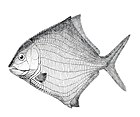Moythomasia
| Moythomasia Temporal range: | |
|---|---|

| |
| †Moythomasia nitida Gross 1953 from the Devonian (Givetian) of Bergisch-Gladbach, Germany. | |
| Scientific classification | |
| Domain: | Eukaryota |
| Kingdom: | Animalia |
| Phylum: | Chordata |
| Class: | Actinopterygii |
| Family: | †Moythomasiidae Kazantseva, 1971 |
| Genus: | †Moythomasia Gross, 1950 non Whitley, 1951 |
| Species | |
| |
| Synonyms | |
| |
Moythomasia (named for James Alan Moy-Thomas)[1] is an extinct genus of early ray-finned fish from the Devonian period of Europe and Australia.
Moythomasia was a small freshwater fish, 9 centimetres (3.5 in) long. It had relatively large eyes, presumably to find prey in murky water. Its body was covered in specialized ganoid scales; the upper side of each scale sported a small pin that perfectly fit into the hollow lower side of the next scale. This allowed the fish to be both armored and flexible.[2]
Species
- M. devonica (Clarke, 1885) [Palaeoniscus devonicus Clarke, 1885; Rhadinichthys devonicus (Clarke, 1885)]
- M. durgaringa Gardiner & Bartram, 1977
- M. lineata Choo, 2015
- M. nitida Gross, 1953
- M. perforata (Gross, 1942) [Aldingeria perforata Gross, 1942]
References
- ^ Alexander, R. McNeill (1975). The chordates. London; New York : Cambridge University Press. pp. 18–19. ISBN 978-0-521-20472-9.
- ^ Palmer, D., ed. (1999). The Marshall Illustrated Encyclopedia of Dinosaurs and Prehistoric Animals. London: Marshall Editions. p. 35. ISBN 1-84028-152-9.








